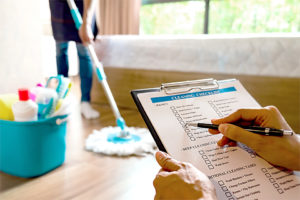One of the places where we spend the most time is our bed, approximately 49 hours per week if we sleep 7 hours each night.
At some times, in addition to sleeping, we use it for the office, as a table to eat and if you have a pet you probably also use it to rest. Which is the perfect space for germs.
What Your Sheets Accumulate
The bed is the perfect breeding ground for the reproduction of fungi and bacteria. When we sleep we generate moisture with our body, in addition to other bodily fluids such as saliva, sweat or dead skin. All that cocktail of fluids is the perfect food to attract annoying mites that can cause allergies and skin infections.
Eczema, asthma or scabies are diseases closely linked to bedding. Therefore, it is important that we pay close attention to our hygiene and that of our sheets.
Be Careful With Dirty Hands And Clothes
To minimize the dirt that can accumulate between your bedding, you should know the little things that can make it dirty.
Keep in mind the cleanliness of your pajamas, since in the end it is the one that is in direct contact with our skin and can carry dust and residue. Additionally, avoid supporting clothing or objects when they are discarded and try to handle them with clean hands.
Need help keeping your home clean and neat? Our maid service team can help! Contact us today!
Good Hygiene Helps You Rest Better
One of the best feelings after a hard day at work is arriving and being able to lie down in your clean, stretched bed.
Additionally, the color white inspires cleanliness, purity and relaxation, which is why a bed with white sheets will make us feel like we are sleeping more and better. Additionally, our skin captures cleanliness and freshness, so sleeping in a well-clean bed will give us a greater feeling of rest.
How Often Should You Change The Sheets?
We must take into account the recommended frequency but also be realistic, since there are weeks and days in which we do not have that much time.
These changes will also depend on some factors such as whether we sleep alone or with others, if we sweat a lot, or if we have been sick. You must take these factors into account when changing your bedding.
Sheets: The ideal is to change them once a week and wash them at high temperatures so that any bacteria that may have accumulated are thoroughly eliminated. In the summer months, as we will sweat more at night, it is recommended to increase this frequency to twice a week.
Pillowcases: It is recommended to change them every two days. The skin of the face and hair are in direct contact with them and possible traces of makeup, dead cells or dirt can accumulate more easily. Every two days.
Washing Pillows, Mattress and Pajamas
In addition to changing sheets and covers, it doesn’t hurt to know the useful life of your mattress or pillows and how often to wash them, as well as the importance of sleeping in clean pajamas.
• Wash pillows every 3 months: After 2 years, 10% of the weight of an unwashed pillow corresponds to dead mites. Along with them, bacteria, dead skin and countless species of fungi also accumulate, which is why it is recommended that you wash your pillows at least every 3 months and dry them very well to avoid the appearance of moisture and mold.
• Give your mattress a once-over every 6 months: The mattress also accumulates dust, bacteria and mold. To clean it, you can vacuum it or air it in the sun every half year.
• Pajamas: They should be washed and changed every two days at least, however, they can be used for a few more days if they have only been worn overnight.





